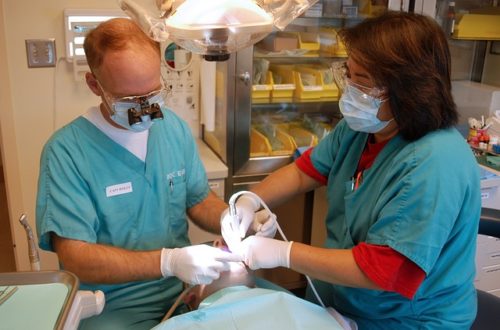5 Tips on How to Get Modern Dental Care Without Breaking the Bank

Modern dental care can involve seeing your dentist or dental specialist for various types of oral procedures beyond routine examinations and cleaning. Even with the greatest care of your teeth and gum, you may still require some type of dental work. For example, adults may need root canals or dental implants to save a tooth. Children and teenagers with orthodontic problems may need to see an orthodontist to get braces installed.
These types of necessary modern dental care can put a huge dent in the pocket of people with and without dental insurance coverage. As such, getting modern dental care without breaking the bank comes down to knowing how to get low-cost or free dental care for you and your family members. And, according to the American Dental Association (ADA), this is not something that is impossible to do.
Types of Costly Dental Procedures
- Fillings
- Implants
- Veneers
- Root canal
- Bridges
- Braces
- Oral cancer screening
- Whole mouth reconstruction
- Oral surgery
Ways to Pay Less for Modern Dental Care
Here are 5 tips that can prevent you from having to “pay through the nose” for these and other types of dental procedures and still receive quality care. Note that eligibility for low-cost insurance may be based on a case-by-case basis and may take into consideration your income. For example, insurance provided on a sliding scale fee basis.
1. Dental insurance coverage
The ADA recommends that adults, children, and teenagers do routine checkups and cleaning at least twice a year. Teeth cleaning is one of the least expensive dental care procedures and can cost approximately $100 per visit, or even more, depending on the dentist you visit. Some people have the option of getting insurance coverage under Medicaid or Medicare. Their children may be eligible for coverage under the Children’s Health Insurance Program (CHIP) or a similar government or state-funded program.
You can also get coverage under insurance from your employer, private insurance as a self-employed person, or the federal health insurance marketplace for a fixed monthly premium. However, and depending on the type of insurance plan, premiums, deductibles, and co-payments can quickly add up and still make dental services costly to you. In the end, you may be forced to pay for dental care or seek other options that are less costly, or free.
2. Student dentist
Getting treated by a student dentist at a dental school is another option for receiving modern dental care without breaking the bank. However, persons are usually skeptical about the level of care they will receive from a student dentist. Student dentists may provide quality care comparable to a trained and certified dentist. This is because they are supervised by professional instructors who may be dentists themselves. Under their guidance, the student dentists may treat you for a fraction of the hefty cost of a dental practitioner.
Note that your wait time may be a bit longer since the treatment is supervised and verified by the instructor. However, the advantage is getting quality treatment for less. You may search at the Commission on Dental Accreditation to find an accredited dental school near you.
3. Community clinics or charity events
You may be able to access low-cost or free modern dental care at community clinics or charity events that offer various types of treatments to people of all ages. Care is usually offered by board-certified dentists who may opt in or volunteer to provide various services. Retired seniors who may no longer be eligible for certain dental overage under Medicare, for example, can benefit from these community programs.
Community clinics may offer their services on a sliding scale fee basis. This means your price will be calculated based on your ability to pay as an employed, self-employed, or unemployed person. You can find community clinics by searching online for a center near you. You may also search online for listings of dental associations in your state or city that provide assistance to ease the financial burden.
4. Shop around for a low-cost dentist
There are plenty of low-cost dentists that can offer high-quality dental care at an affordable price. Granted, it may take some time to shop around to find a dentist who offers the most affordable services. Once you find a list of dentists in your area, give them a call to ask about the cost for the service you need.
You may find out about dental plans they offer that allow you to pay over time by making monthly installments. This can be especially useful if you have to do expensive dental procedures such as roots canals, implants, crowns, bridges, braces, or oral surgery. Some dentists even offer interest-free credit, special packages, or discounts.
5. Discount plans
Another option to consider is dental discount plans offered by companies providing these financial arrangements to the uninsured. These dental plans are different from insurance coverage but can get you dental care at a discounted rate of between 10-60% less.
Instead of a monthly premium, you may have to pay a yearly subscription fee that gets you services throughout the year. However, you may be bound to using dentists within their network of providers. Even though you will be paying a subscription fee, it may be a good alternative to not having any insurance at all.
Avoiding Dental Care Can Cost You More!
You can pay tens of thousands of dollars for dental care, even with insurance. This is according to the ADA. This may tempt many people to avoid dental care altogether. However, it can be more costly in the long run if you develop chronic or irreversible dental problems such as gum disease or periodontitis which can infect or damage the tooth root or pulp if left untreated.
This can result in loose tooth, tooth loss, or loss of jaw bone structure. Remedial dental care such as a root canal or dental implant will end up costing far more than if you had done regular dental checkups and fixed minor problems as they arose.
Remember, not having enough money doesn’t mean you have to go without dental services. You can find a dentist or dental clinic to suit your needs at a low cost, or even for free!
Would you like to receive similar articles by email?





